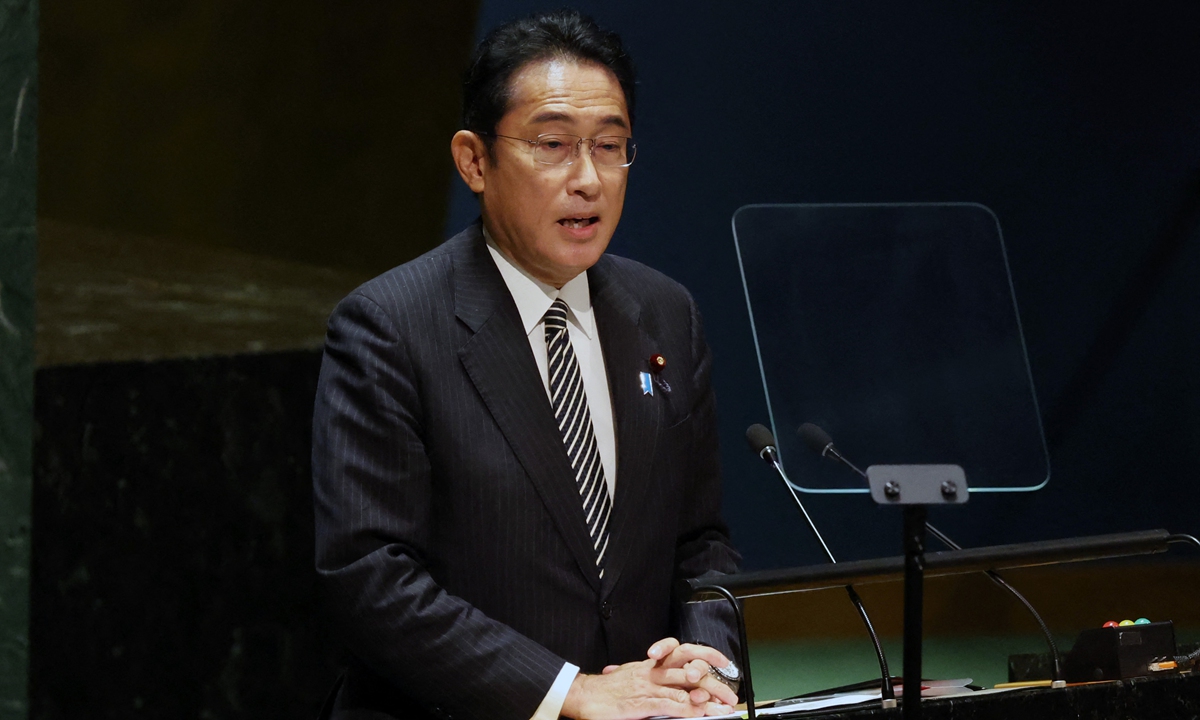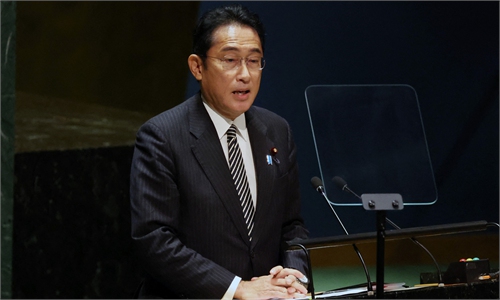
Prime Minister of Japan, Fumio Kishida. Photo: AFP
After the US-Japan-South Korea meeting touched on the Taiwan question at the East Asia Summit, strongly opposing "any unilateral attempts to change the status quo" in the Indo-Pacific, the Chinese Foreign Ministry urged the relevant countries to abandon their Cold War mentality and stop building up small cliques.
Meanwhile, Japanese Prime Minister Fumio Kishida explicitly criticizing China during the latest ASEAN-East Summit in Cambodia adds new obstacles to Japan-China relations, despite the leaders of the two countries were reportedly to have their first in-person meeting in three years, Chinese experts said.
Following a US-Japan-South Korea meeting on Sunday on the sidelines of the East Asia Summit, the leaders of the three countries issued a joint statement strongly opposing "any unilateral attempts to change the status quo in waters of the Indo-Pacific." Kishida, South Korean President Yoon Suk-yeol and US President Joe Biden also emphasized that their basic positions on the Taiwan question "remain unchanged," reiterating the importance of maintaining peace and stability across the Taiwan Straits, the statement said.
The Asia-Pacific is a promising land for cooperation and development, not a chessboard for major-power rivalry. The countries concerned need to follow the trend of the times, abandon the Cold War mentality, stop piecing together exclusionary circles, and refrain from affecting peace and stability in the Asia-Pacific, Mao Ning, spokesperson of the Chinese Foreign Ministry, told a routine press conference on Monday.
If the countries concerned truly hope to maintain peace and stability across the Taiwan Strait, what they need to do is to follow the one-China principle, and join China in unequivocally opposing "Taiwan independence," she said.
While the international community expecting the ASEAN-East Asia Summit as well as the upcoming G20 and APEC to bring new momentum to the world's economic recovery and help find new consensus for regional and global cooperation, some countries, particularly the major allies of the US, have actively hyped up the so-called concerns over China's influence in the region, casting a shadow over possible interaction between the leaders at the meetings.
Speaking at the East Asia Summit in Cambodia on Sunday, Kishida told other Asian leaders that "China was infringing on Japan's sovereignty" and escalating tensions in the region, Reuters reported. He also mentioned that ensuring peace and stability in the Taiwan Straits was important for regional security, voicing "serious concern over the human rights situation" in Northwest China's Xinjiang Uygur Autonomous Region.
Compared to South Korea, Japan has been much more eager to cooperate with the US' strategy of containing China in the region, some experts said. Right-wing forces in Japan have been rising and hyping the "China threat," and Japan's substantive moves on the Taiwan question have gradually escalated over the past few years. Furthermore, Kishida's latest remarks dampen the atmosphere of a possible meeting between the leaders of the two countries, experts said.
"What Kishida had said reflects the strategic intention of Japan," Da Zhigang, director of the Institute of Northeast Asian Studies at Heilongjiang Provincial Academy of Social Sciences, told the Global Times on Monday.
China should remain cautious about Japan's moves on China, including the use of multilateral mechanisms such as US-Japan-South Korea and Quad to contain China, and Japan may further flip-flop on the Taiwan question, pointing fingers at China's internal affairs, Da said.
Kishida will hold talks with Chinese President Xi Jinping on Thursday at an APEC gathering in Bangkok, Reuters reported on Monday, citing Tokyo's top government spokesperson. The leaders spoke on the phone in October 2021 after Kishida's election, but this will be their first in-person meeting, the media report said.
"What the Japanese prime minister has said is like pouring cold water on the possible meeting of the two leaders… We won't count on one meeting to change the course of bilateral relations, but the two sides need to manage differences effectively amid rivalry of major powers," Da said.
2022 marked the 50th anniversary of the normalization of China-Japan diplomatic relations, but the status of bilateral ties has been riven with difficulties given the influence of historical and geopolitical factors, experts said.
"Kishida faces growing pressure domestically, as his cabinet's approval rating fell to a record low and he needs to show this kind of strong stance on diplomacy to win more points," said Da, who also warned of duplicity from Japan in its China policy.
Over the past three years, Japan has been taking a much more active stance in cooperating with the US. For example, it has been provocative on the Russia-Ukraine crisis and adding problems to China-Japan relations, experts said.
"We hope that Japan won't escalate those moves in damaging bilateral ties, and we need such occasions to present our clear stances on matters related to the territorial integrity and international situation," Da said.


